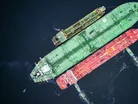How insurers are preventing Russian oil from reaching Europe

Europe's P&I maritime insurers have found themselves on the frontline when it comes to Russian oil shipments. But just how effective is the strategy - and how serious are the consequences for those that risk sailing uninsured?
The EU imposed strict regulations on the shipping of Russian oil within its territories. It managed this by imposing a per-barrel price cap on imports of Russian crude. Anything costing above US$60 a barrel is now uninsurable.
The move is causing havoc for the shipping industry as insurers threaten to withdraw cover on tankers failing to meet the EU price cap. The result is a log jam of vessels waiting to cross through Turkish waters as officials enforce strict guidelines on underinsured tankers.
Currently, experts say there is a 19-strong vessel traffic jam of tankers, one of which has been delayed for six days.
The threat of insurance being withdrawn in the event of a sanctions-busting incident is an outcome most shipping companies want to avoid. Shipping insurance covers the crew, the vessel, and the actual shipment is made. If the cover is withdrawn, it puts the entire operation at risk - not just the cargo.
Norwegian insurers covering the Russian oil market
Currently, Norway takes a leading role in the cover of oil tankers coming from Russia. Data shows that over 20% of 2583 fossil fuel shipments leaving Russia between February and August of 2022, were covered by Norwegian providers, Skuld, Gard or Hydor.
Speaking about the new price cap disruptions to the press, Hilde Søbstad Løvskar, chief legal officer at the Norwegian insurer Skuld, explained, “Sailing uninsured can have major consequences for the surrounding community, including the crew on board the ships. So it is very important that liability insurance companies act in line with adopted sanctions.”
Another pitfall caused by cover being withdrawn is product sales, which then impacts the supply chain. Buyers will refuse to accept an insured delivery, which results in logistical and financial issues, as well as environmental dangers as oil-laden tankers are forced to remain at sea while the debate rages on.
When were Russian oil sanctions imposed?
The US, UK, EU Australia, and Canada introduced an import ban on Russian crude and refined products after the invasion. The US banned all Russian oil and gas imports in March 2022 The move was made as an attempt to deprive Russia of vital financial resources in a bid to halt its entry into Ukraine.
But its success is currently difficult to assess. An estimated 90% of the world’s shipping insurance is provided by European suppliers. The discovery of some tankers carrying oil prices above the cap now looks set to trigger the withdrawal of insurance cover on those vessels if Turkey’s certification guidelines are not met.
In line with EU directives, the Turkish Government is demanding strict certification. However, in an industry twist, shipping insurers have rejected the request in case they knowingly or unknowingly, insurers oil that breaches the current sanction regulations.
The International Group of P&I Clubs (which represent 13 mutual shipping insurers that cover 90% of the world shipping market) has told the press that the Turkish authorities have been especially and unnecessarily heavy-handed in their approach going “well beyond” the information customarily required, according to the chief executive of International Group of P&I Clubs, Nick Shaw, who said “constructive discussions” were taking place to resolve the situation.
Insurers instrumental in enforcing Russian crude oil sanctions
While experts believe the price cap will encourage the flow of discounted Russian oil onto global markets, and, as such, is designed to help protect consumers and businesses, others argue over whether the cap will have an effect in reducing Russian oil revenues. This is because export volumes have not significantly reduced since the invasion of Ukraine.
In fact, Russia has increased oil exports to India and China after Europe shunned its exports.
A disruption of the global supply chain of oil in Europe will further result in the escalation of prices in the west - something to avoid, given the already skyrocketing cost of living.
To further complicate matters, some experts have said that a large proportion of the oil on the ships off Turkey is not Russian - but is of Kazakhstan origin. This data, which comes from shipbrokers and TankerTrackers.com, an industry tracker of global oil shipments, states that Kazakhstan oil arrives in Russian ports via pipeline and is not targeted by western sanctions.
Russia ready to ‘circumnavigate’ insurance restrictions
Furthermore, reports suggest that Russia has created a “shadow fleet” of over 100 tankers to try to circumnavigate western restrictions on its oil exports. This may operate either without insurance or from providers outside the west.
Russian insurance companies have also provided letters of confirmation to Turkish authorities to secure passage through Turkish waters.
This means the shippers with insurance from western providers are currently the tankers being held up, it has been suggested.
These vessels transporting refined petroleum, such as petrol and diesel, are also being allowed access by Turkish authorities. This is because EU sanctions on those fuels do not take effect until February 2023.




